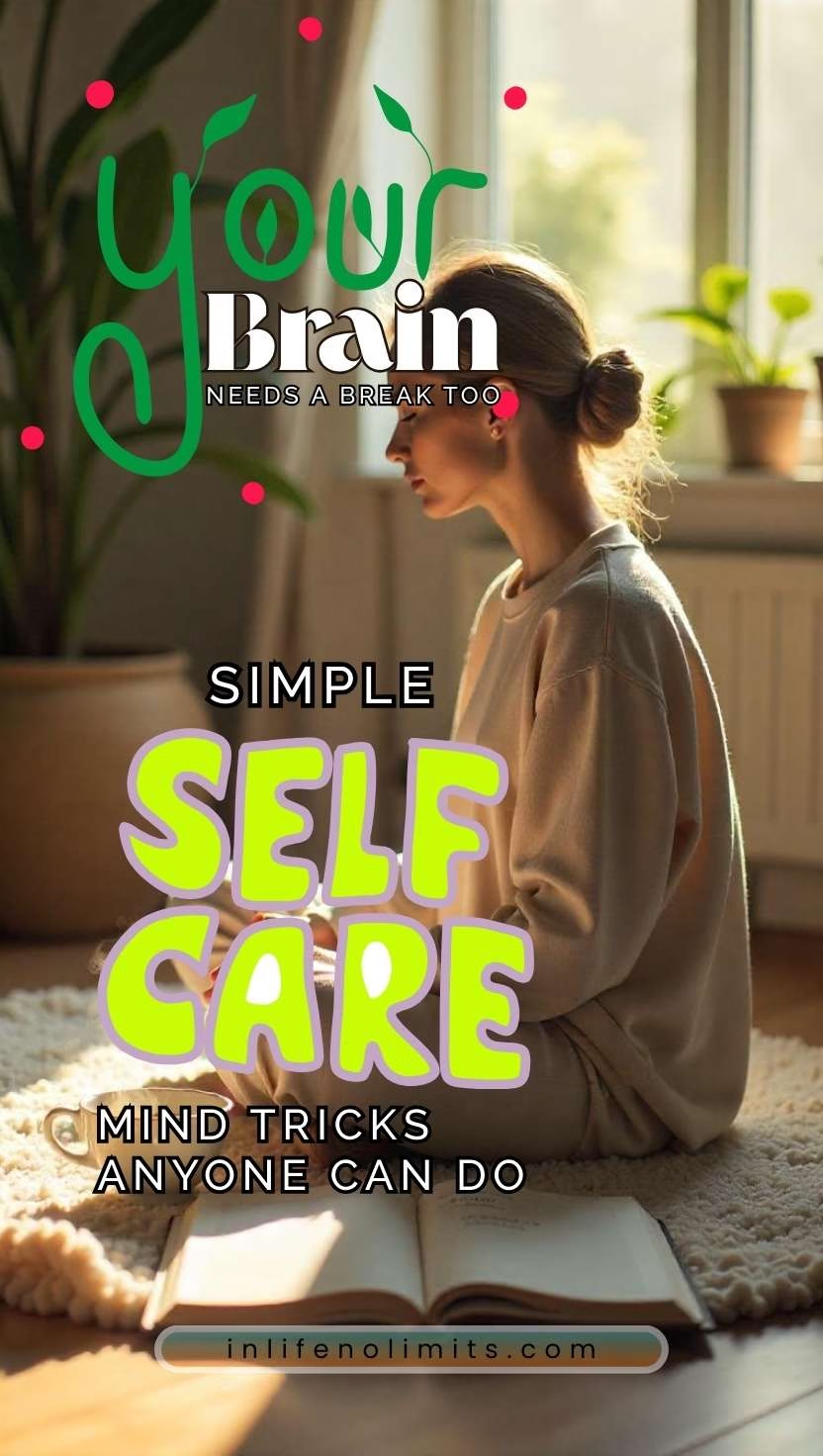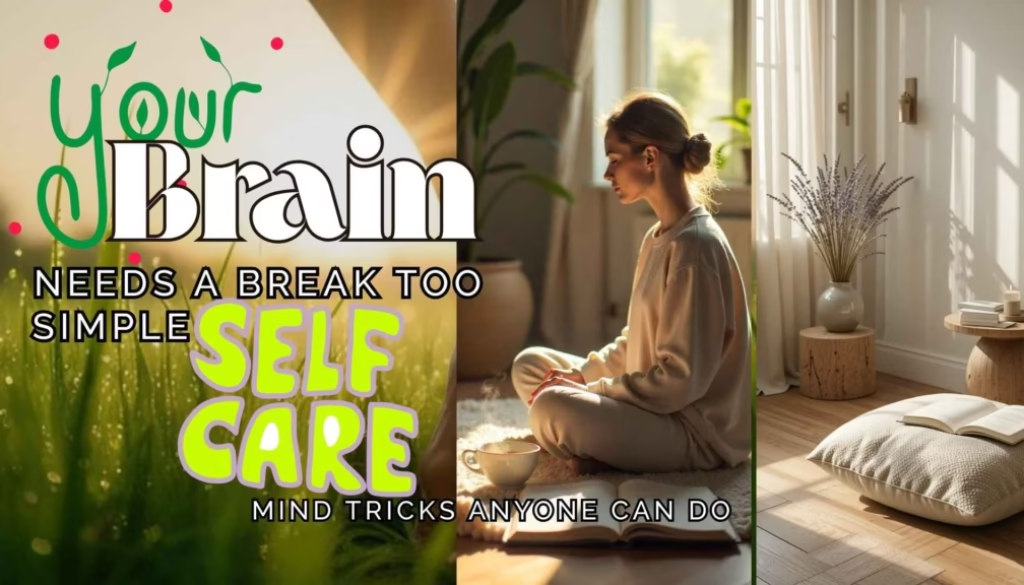This blog may contain affiliate links, which means we earn a small commission if you make a purchase through these links at NO EXTRA COST TO YOU. As Amazon Associates, we earn from qualifying purchases. Thank You!
If you’ve ever been affected by mental health challenges, or know someone who has, then you’ll understand how vital looking after your mind is. It’s such an important area in our overall wellbeing, yet sometimes it feels like the first thing to get neglected when life gets busy.
We talk a lot about self-care these days, often picturing bubble baths or spa days. While those are lovely, self care for the mind goes deeper. It’s about the small, consistent actions we take to support our mental and emotional health, helping us feel more balanced, focused, and resilient. Think of it as essential maintenance for your brain.
Especially for busy Millennials, Gen Z navigating early adulthood, or professionals in demanding fields, prioritizing mind self care isn’t a luxury, it’s necessary. It helps manage stress, prevent burnout, improve clarity, and build the emotional resilience needed to handle life’s ups and downs. These simple self care mind tricks are things anyone can weave into their day.
Key Takeaways:
- Mind self-care is foundational: Like physical health, your mind needs regular care. It involves intentional actions to nurture your mental and emotional health.
- Significant benefits: Practicing self care for the mind demonstrably reduces stress and anxiety, improves focus, boosts emotional resilience, enhances sleep, and contributes to overall happiness.
- Simple practices work: Effective techniques include mindfulness, journaling, engaging in creative outlets, setting digital boundaries, and continuous learning.
- Science backs it up: These activities can lower stress hormones, positively impact brain function, and improve cognitive abilities.
- Build resilience: Consistent self care mind habits help you navigate challenges, manage emotions better, and strengthen your mental foundation.
- Create sustainable routines: Start small, integrate actionable steps into daily life, and track your progress. Think Self Care Vision Board or Self Care Bullet Journal.
The Foundation of Mental Self-Care:
Understanding Your Mind’s Needs
Your mind, much like your body, requires regular attention and care to function optimally. It’s not about eliminating stress entirely, but about developing tools to manage it effectively. Research consistently shows that prioritizing mental self-care leads to significant reductions in anxiety and a marked improvement in overall well-being.
Taking a few moments each day to check in with yourself can make a huge difference. It’s about building awareness of your mental state without judgment.
Try This:
- Set aside 5 minutes each morning for quiet reflection before diving into your day.
- Gently notice your mental state – are you feeling calm, rushed, stressed, content? Just observe.
- Ask yourself: “What’s one small thing that would make today feel a bit easier or more positive?”
Practical Self-Care Tips for Mental Well-being
(Millennials & Gen Z Focus)
Finding ways to care for your mind doesn’t need to be complicated or time-consuming. It’s about finding what works for you and making it a regular practice. Here are some straightforward mind self care ideas.
Find Calm with Mindfulness Practices: The Power of Present Moment Awareness
Mindfulness is simply about paying attention to the present moment without judgment. It pulls you out of worrying about the past or stressing about the future. Practices like meditation, focused breathing, or grounding techniques can significantly calm a racing mind. Even brief moments of awareness integrated into your simple morning habits can transform your day.

Try This:
- 5-Minute Meditation: Use an app or simply sit quietly, focusing on your breath for 5 minutes.
- 4-7-8 Breathing: Inhale quietly through your nose for 4 seconds, hold your breath for 7 seconds, and exhale completely through your mouth for 8 seconds. Repeat 3-4 times during moments of stress.
- Grounding: Notice 5 things you can see, 4 things you can touch, 3 things you can hear, 2 things you can smell, and 1 thing you can taste.
- Mindful Reminders: Set occasional phone reminders to simply pause and take one conscious breath.
Process Your Thoughts with Journaling
Getting thoughts out of your head and onto paper can be incredibly therapeutic. Journaling provides a private space to explore feelings, work through problems, create a mind map of your thoughts, or simply document your day. It’s a powerful form of writing therapy. You can also use it to focus on the positive through self affirmations.

Try This:
- Brain Dump: Spend 10 minutes writing down whatever comes to mind, without censoring.
- Gratitude List: Write down 3 things you’re grateful for each day.
- Affirmation Practice: Write down a few positive self affirmations and repeat them.
- Use Prompts: Explore feelings using prompts like “Today I felt…” or “I’m currently struggling with…”
- Consider starting a Self Care Bullet Journal to track moods and habits.
Spark Joy with Creative Outlets for Mental Release
Engaging your creativity is a fantastic way to relax and de-stress. Activities like painting, drawing, crafting, playing music, or even using adult coloring books allow your mind to focus on something enjoyable and enter a state of flow. Research indicates that creative activities can significantly reduce stress hormones in the body.

Try This:
- Adult Coloring Book: Spend 15 minutes coloring intricate patterns.
- Try a Craft Kit: Pick up a beginner-friendly kit for something like pottery, candle making, or cross-stitch.
- Doodle: Let your pen wander freely on a page without any specific goal.
- Learn an Instrument: Even 10 minutes of practice can be meditative.
Refresh with Digital Wellness & Boundaries
Constant notifications and the pressure of social media can significantly impact mental health. In our hyper-connected world, creating healthy digital boundaries is crucial. Studies suggest excessive screen time can increase anxiety levels. Scheduling regular breaks, or a digital detox, allows your mind to rest and recharge.

Try This:
- Implement a Daily Screen-Free Period: Designate at least one hour (especially before bed) where you don’t check your phone or screens.
- Create Tech-Free Zones: Make areas like the bedroom or dining table screen-free.
- Notification Audit: Turn off non-essential notifications to minimize interruptions.
- Use App Limits: Utilize built-in phone features or apps to track and limit time spent on specific social media platforms.
Engage Your Brain with Reading & Learning
Keeping your mind active and engaged is a key part of self care for the mind. Reading books, articles, or learning a new skill stimulates your brain, broadens your perspective, and can provide a healthy escape. It’s about self growth and becoming a better self.

Try This:
- Read 1 Chapter: Aim to read just one chapter of a book each day.
- Learn Online: Use platforms like Coursera, Skillshare, or even YouTube tutorials to learn something new (language, coding, cooking).
- Listen to Podcasts: Explore informative podcasts during your commute or chores.
Why This Works:
The Science Behind Mental
Self-Care
These self care mind practices aren’t just feel-good activities; they have real, measurable effects on your brain and body. Engaging in activities like mindfulness and meditation has been shown to reduce levels of cortisol, the body’s primary stress hormone. Research suggests mindfulness can actually change neural pathways, strengthening areas associated with focus and emotional regulation.
Furthermore, studies consistently link self-care practices to tangible benefits like improved sleep quality, enhanced cognitive function, and significant reductions in reported stress levels. There’s also a strong connection between physical health and mental and emotional health. Regular exercise, sufficient sleep, and a balanced diet all contribute to a healthy mind. Making choices to eat healthy on a budget, for example, supports both your physical and mental energy levels.
Building Your Emotional Resilience:
Strengthening Your Mental Foundation
Emotional resilience isn’t about avoiding stress – it’s about handling it better and bouncing back from adversity. Consistent self care mind practices are fundamental to building this resilience. When you regularly check in with yourself through journaling, calm your nervous system with mindfulness, or process feelings through creative outlets, you become better equipped.
Practices like gratitude journaling actively shift your focus towards the positive. Challenging negative thought patterns and consciously celebrating small wins also strengthen your mental foundation. Don’t underestimate the power of positive self affirmations either. Sometimes, finding inspiration in simple words helps, like exploring Irish quotes and sayings for a dose of perspective.
According to resources like Harvard Health, developing coping mechanisms through self-care significantly improves our ability to navigate challenges.
It’s also crucial to recognise when you might need more support. Self-care includes knowing when to reach out for professional help from resources like Mind (UK) or the HSE YourMentalHealth service in Ireland.
10 Quick Wins for Your Mind
Breathe Deep
Take 5 deep belly breaths
Meditate Moment
Sit quietly for 3-5 minutes
Gratitude Note
Write down 1 thing you’re thankful for
Step Outside
Spend 5 minutes in nature
Hydrate
Drink a full glass of water mindfully
Stretch
Do a simple 2-minute stretch routine
Positive Affirmation
Say one kind thing to yourself
Creative Break
Doodle or color for 5 minutes
Read a Page
Read just one page of a book
Disconnect
Put your phone away for 10 minutes
Try This (Resilience Boosters):
- Practice daily gratitude (list 3 things).
- Gently challenge negative thoughts: Ask yourself, “Is this thought truly accurate? What’s another perspective?”
- Acknowledge and celebrate small accomplishments throughout your day.
- Connect with supportive friends or family.
Making it Stick:
Creating Your Personal Self-Care Routine
Building habits takes time. Be patient with yourself. Resources focused on habit formation, like insights from James Clear’s “Atomic Habits” or articles on sites like Psychology Today, can offer practical strategies. Integrating these small steps consistently contributes to becoming a better me. Check out ideas for calming morning routines for more inspiration.
Try This (Making it Stick):
- Choose just one new practice from this guide to focus on this week.
- Set a realistic, small time commitment for it (e.g., 5 minutes daily).
- Track your progress simply in your self-care journal or a notebook – just note if you did it.
Your Next Steps to a Calmer Mind
Starting your mental self-care journey doesn’t require a huge overhaul. It begins with small, intentional choices.
- Choose one practice from this guide that resonates with you right now.
- Commit to trying it consistently for just one week.
- Gently notice how it affects your mental state, energy levels, or mood.
- Once it feels comfortable, consider gradually adding another small practice.
Take Care of Your Mind
Your mind works hard for you every single day. Giving it the care and attention it deserves isn’t selfish; it’s essential for your overall wellness and ability to show up fully in your life. Start small, stay consistent, and watch how these practices transform your daily experience. Remember that focusing on things like heart-healthy foods also supports your body and mind connection.
What are your favorite ways to practice self care for the mind? Share your ideas in the comments below!
Remember, caring for your mind isn’t selfish – it’s necessary. Your mental well-being affects every aspect of your life, from relationships to productivity. Start small, stay consistent, and watch how these practices transform your daily experience.













